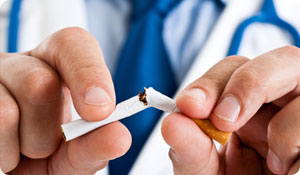
If you're a smoker, nothing is likely to have as profound an impact on your health as putting out your cigarettes. Cigarette smoking accounts for more than 440,000 deaths in the United States annually with more than 135,000 of those related to cardiovascular problems. What makes cigarette-related fatalities even more tragic is the fact that they are preventable. Quitting smoking—at any time and any age—immediately increases your chances of enjoying a longer, healthier life than you would have as a smoker.
Unfortunately, breaking the habit is much easier said than done, but understanding how smoking damages your heart may be the best first step to quitting. So arm yourself with the facts:
- Smokers are two to four times more likely to develop coronary heart disease.
- Smokers are two times more likely to suffer a stroke.
- Smokers are 10 times more likely to develop peripheral vascular disease.
These problems are a direct result of the effect cigarettes have on your heart, including an increase in blood pressure; an elevated heart rate; reductions in blood flow and the amount of oxygen that reaches body tissue; and changes to blood vessels and cells, which contribute to plaque buildup.
Guidelines on Quitting
In light of these facts, you can see why health agencies offer just one recommendation for smokers: quit. Specifically, quit as soon as possible. Cutting down is not a healthy option since there is no such thing as a "safe" number of cigarettes per day.
Once you do quit, do your best to avoid active smokers since links between exposure to secondhand smoke and cardiovascular disease are well-documented. In fact, the Centers for Disease Control & Prevention (CDC) estimate that 46,000 nonsmokers die from coronary heart disease each year as a result of exposure to secondhand smoke.
Cigar and pipe smokers should also kick their habits. While the health risks aren't as great as they are for cigarette smokers, cigar and pipe smokers do seem to be more likely to suffer from coronary heart disease than nonsmokers.
Making It Happen
Nicotine addiction is one of the hardest addictions to break. Added to the challenge is the fact that the actions involved in smoking, such as holding a cigarette, can be addictive as well.
One approach to smoking cessation is nicotine replacement therapy. Using nicotine gum, patches, or inhalers, you can continue to get the nicotine you crave (as you wean yourself off) while avoiding the tars, chemicals, and poisonous gases that are present in cigarettes.
While these can be effective for easing your nicotine cravings, some people find that they don't satisfy the desire for a cigarette experience. Thus, a more recent approach to quitting has been to switch to electronic cigarettes (or "e-cigarettes"). These tobacco-free battery-operated devices provide vaporized nicotine. The device is usually crafted to look like a cigarette and you hold it in a similar way. E-cigarettes contain only a small fraction of the chemicals found in traditional cigarettes. However, since the FDA can't regulate these devices, there is a higher likelihood of defects and unapproved additives that can be potentially harmful to users. Thus, some health professionals are reluctant to recommend them as a safe, effective option.
There are other non-nicotine options to help you quit as well. These may alter mood transmitters in the brain that are linked to addiction or decrease the desire for nicotine by affecting nicotine receptors in the brain. Your healthcare provider can determine whether these treatments are appropriate for you.
In addition to trying nicotine aids, adopting behavioral and lifestyle changes can help you break the habit:
- Before you quit, think about why you want to quit; this can help you stay focused and motivated.
- Tell family, friends, and colleagues that you're quitting, and ask them to help you stick to your goal.
- Begin an exercise program or hobby to help you to stay active and keep your mind off cigarettes.
- Choose a relatively stress-free time to start weaning yourself, and be sure to get enough rest; you're more likely to fall back into bad habits if you're tired or stressed.
Sources:
"Smoking & Cardiovascular Disease (Heart Disease)." American Heart Association. February 22, 2012. Web. June 21, 2012.
http://www.heart.org/HEARTORG/GettingHealthy/QuitSmoking/QuittingResources/Smoking-Cardiovascular-Disease_UCM_305187_Article.jsp
"Health Effects of Cigarette Smoking." Center for Disease Control. n.d. Web. June 21, 2012.
http://www.cdc.gov/tobacco/data_statistics/fact_sheets/health_effects/effects_cig_smoking/
"Smoking and Cardiovascular Disease." Yale Medical Group. n.d. Web. June 21, 2012.
http://www.yalemedicalgroup.org/stw/Page.asp?PageID=STW022892





